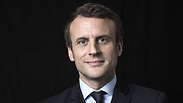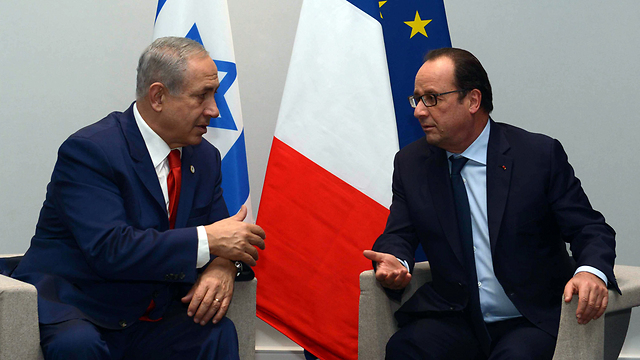
Macron's win may usher in improved France-Israel relations
Analysis: Emmanuel Macron's victory in the French presidential elections could signal a shift in relations between the republic and Israel, which reached a particularly low ebb during the era of François Hollande; Macron has shown himself to be an opponent of BDS, and unlike his predecessor, against unilateral recognition of a Palestinian state.
Prime Minister Benjamin Netnyahu congratulated Emmanuel Macron on his victory in the French presidential elections on Sunday, saying "I expect to work with President Macron and to deal with shared challenges, together with him, for our democracies."
"One of the biggest threats that stands before the world today is extremist Islamic terror that has hit Paris, Jerusalem and many cities in the world. France and Israel are old allies and I am sure that we will continue to deepen our relations,” he added.
Macron's win is good news not only for Israel, but also for the French Jewish community, who mainly objected his rival—the far right candidate Marine Le Pen, who supported banning Shechita (The Jewish Religious Humane Method of Animal Slaughter for Food) and male circumcision.
Macron is considered to be pro-Israel. He supports the two-state solution, and objects a one sided recognition of a Palestinian state as he believes it will not benefit either side. He also holds close ties with the Jewish community in France and many of his friends are Jewish businessmen from the time he worked as an investment banker at Rothschild & Cie.
In his time as France's Minister of Economy, Industry and Digital Affairs between the years 2014-2016, Macron expressed a firm stance against the BDS movement and any type of sanction against Israel. He even arrived in Israel as a guest of Aryeh Deri, who was the Minister of the Economy at the time.
The Israeli politician, who is considered closest to Macron, is MK Yair Lapid (Yesh Atid), who met him in March this year and maintained close ties with him. "He is very much for us. Israel should be glad; he's normal, sane and a centrist," commented Lapid after Macron's win.
39-year-old Macron's win means the end of the era of François Hollande, seen as a low point in the Israel-France relations. During that time the French tried to defiantly get themselves involved in Israeli-Palestinian negotiations without coordination with Israel.

Macron's rise to power could mean the strengthening of cooperation between Israel and France.
With that, political sources in Israel are expecting a continuation of the French foreign policies, with no strategic changes and no new pretensions.
They state that Macron's main difficulty in starting his new position is that he has no party, and that his priority right now is to get as many of his people as he can through June's elections for the National Assembly.
The size of the faction that Macron can manage to gather in the assembly will determine his ability to pass reforms and take economic and security emergency measures.
If he does not succeed in creating a big enough faction, the newly appointed president will have to rely on conservative parties and begrudgingly adopt some of their agenda, limiting his ability to make any significant changes.
(Translated & edited by Lior Mor)










